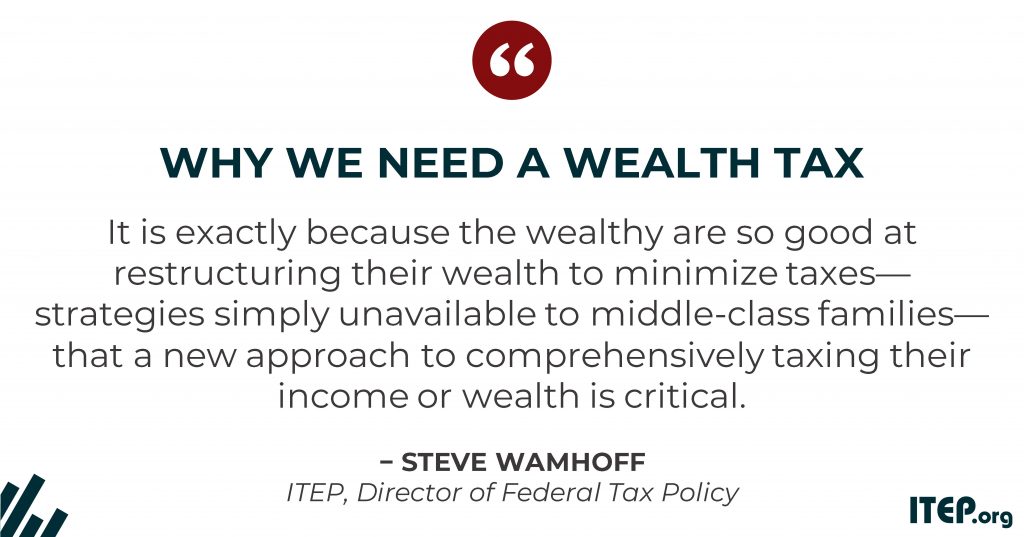Should lawmakers enact laws that they believe are sensible and constitutional, or should they shape their legislative agenda around what they believe ideological Supreme Court justices will allow? This is a dilemma facing Americans who support a federal wealth tax.
To be clear, there are many proposals to reform taxes on the income from wealth (such as capital gains) which do not raise as many constitutional questions. But taxing wealth itself, with a federal tax on the net worth of very wealthy households, is a different proposal that raises different questions. The idea has received much attention since Senator Elizabeth Warren proposed it in 2019, and polling shows that large majorities support it.
But supporters of a wealth tax are haunted by the fear that the Supreme Court—which now includes three justices appointed by former President Donald Trump as well as three others appointed by Republican presidents—would strike it down.
As a new report from the Roosevelt Institute explains, it is important to distinguish a descriptive argument about the Constitution—an argument about what the Constitution says and what it allows Congress to do—from a predictive argument, which is about how a majority on the Supreme Court might decide the matter. The Roosevelt report provides a detailed descriptive argument that the Constitution does not create any obstacles to a federal wealth tax.
Making predictions about how Supreme Court justices will view the matter is more difficult. But even if they strike down a wealth tax, enacting one is not in vain. To the contrary, it could provide the catalyst for even greater change. The last time the Supreme Court reached beyond the commonly understood meaning of the Constitution to dramatically restrict Congress’s taxing powers was in 1895 when the Court struck down a federal personal income tax. This so outraged the nation that it ratified the 16th Amendment 18 years later, reversing that result.
One lesson from this is that enacting a federal wealth tax is part of a long game. Lawmakers should pass laws that they believe both solve problems and are consistent with our Constitution and hope that the Supreme Court agrees on that last point. If five justices disagree and strike down a hugely popular measure that addresses a pressing issue, the result could be a constitutional amendment, greater public scrutiny of future Supreme Court appointments, or fundamental reform to the Court.
It is worth playing the long game given the enormity of the problems we must solve. The most recent data from inequality researchers Emmanuel Saez and Gabriel Zucman indicate that the wealthiest 0.1 percent of Americans (the wealthiest one in one-thousand Americans) own 18 or 19 percent of the wealth in this country depending on which measure one uses.
The racial wealth gap is particularly severe. According to the Federal Reserve’s Survey of Consumer Finances for 2019, the median wealth and average wealth for Black families was just 15 percent that of white families, and wealth of Hispanic families was just a little higher than that of Black families.
A federal wealth tax could be one of the most effective ways to reduce the wealth gap and particularly the racial wealth gap. Incredibly, opponents who claim that a federal wealth tax is unconstitutional rely on clauses that were included in the Constitution for no purpose other than to broker the compromise that treated enslaved people as less than full human beings and allowed slavery to continue for years in America—which itself is one of the root causes of our wealth disparity.
Why Wealth Tax Opponents Say It’s Unconstitutional and Why They’re Wrong
ITEP explained in a 2019 report that the United States could use a wealth tax to address exploding inequality and raise revenue. This type of tax would be a challenge to administer but that challenge is surmountable. Since then, tax scholars have suggested several ways that the implementation of a wealth tax could be streamlined.
The other type of challenge to a wealth tax comes from those who argue that a federal tax on wealth would violate the Constitution. The argument centers on whether a wealth tax would be a “direct” tax which, under the Constitution, must meet byzantine conditions that would make it unworkable.
Constitution describes how a “direct” tax should be apportioned among states—based on population and counting each enslaved person as three-fifths of a person—but never explains what a direct tax is. The historical record indicates that the drafters themselves were unclear on what a direct tax might be.
For most types of taxes, apportionment by population would be bizarre and nonsensical. As ITEP’s 2019 report explained,
Imagine there are two states, Poorland and Richland, that have the exact same population. If a tax is apportioned by population, the total amount of that tax paid by these states would be the same. Imagine that Richland had twice as much wealth as Poorland. If a wealth tax was subject to the apportionment requirement, then the residents of Poorland would have to pay the wealth tax at a rate that is exactly twice the rate paid by those of Richland. That is the only way that residents of both states would pay the same amount of tax per capita, as required under an apportionment rule.
So, what were the drafters thinking? The most plausible explanation is that they were not trying to define a category of taxes that must be apportioned by population. Instead, they were saying that taxes that can be apportioned by population will be apportioned in a certain way—counting each enslaved person as three-fifths of a person while counting everyone else as a full person.
Delegates to the Constitutional Convention focused on finding a compromise that all the states could agree to. Delegates from southern states wanted enslaved people counted as part of their populations for determining the number of representatives elected to the House from each state. At the same time, the southern delegates did not want enslaved people counted as part of the population for the purpose of any federal tax apportioned by population.
The men who spoke on behalf of southern states at the convention wanted to maximize their clout in Congress while minimizing the federal taxes paid by their states. The “compromise” that southern and northern delegates settled on was to count each enslaved person as three-fifths of a person for both purposes. The direct tax clauses are part of that compromise.
This is what the legal scholar Bruce Ackerman calls the “tainted origins” of the direct tax clauses. They are part of the infamous “Three-Fifths Compromise” that allowed slavery to continue in the United States, and were not related to principles like freedom, individual rights, democracy or anything else we like to believe is at the heart of constitutional law.
Ambiguity over the term “direct tax” apparently helped the delegates reach a compromise. The only thing that seems clear is that southern delegates were assured that any tax apportioned by population would be apportioned in this way.
And for a century after the Constitution was ratified, that is how the Supreme Court interpreted the language. For example, the court held that a federal tax on carriages was not a direct tax that must be apportioned by population because treating it as such would be impractical and nonsensical.
But in 1895 the Supreme Court took a sharp turn away from precedent and held in Pollock v. Farmers’ Loan & Trust Company that a recently enacted federal income tax was a direct tax and was therefore unconstitutional because it was not apportioned by population (which would itself be absurd). This decision was widely criticized as conflicting with all case law that came before it and led to the ratification of the 16th Amendment in 1913 allowing the federal income tax.
More importantly, the Supreme Court backed away from its reasoning in Pollock almost immediately to the point where it is unclear that the opinion still has any weight. For example, the Supreme Court blessed a federal tax on inheritances, which is arguably just a wealth tax imposed at death.
What the Direct Tax Clauses Mean for Us Today
As the Roosevelt report explains, some scholars believe that the direct tax clauses should play almost no role in constitutional law given that they are part of a compromise over slavery that has no bearing today.
But, as the report argues, even those who look past the tainted origins and ambiguous language can take a measured approach that does not preclude a federal wealth tax. Direct taxes at the time of the Constitution’s drafting were generally known to include any tax specifically on real estate. A tax on net worth (even if one’s net worth partly includes real estate) is fundamentally different. For example, a piece of real estate may be valuable for the purposes of property taxes while also reducing net worth for the purposes of a wealth tax because it is mortgaged. Unlike taxes on real estate, a wealth tax should be seen as raising no constitutional problems.
Of course, we do not know how the conservative majority on the Supreme Court will see the matter. But history—the history of the Court’s deference to Congress’s power to tax and the history of this nation’s reaction against the Court when it deviates from that path and steps on that authority—is on the side of those who support a wealth tax. Creating a fair and more equal society is a long game that may not be won with a single piece of legislation.





